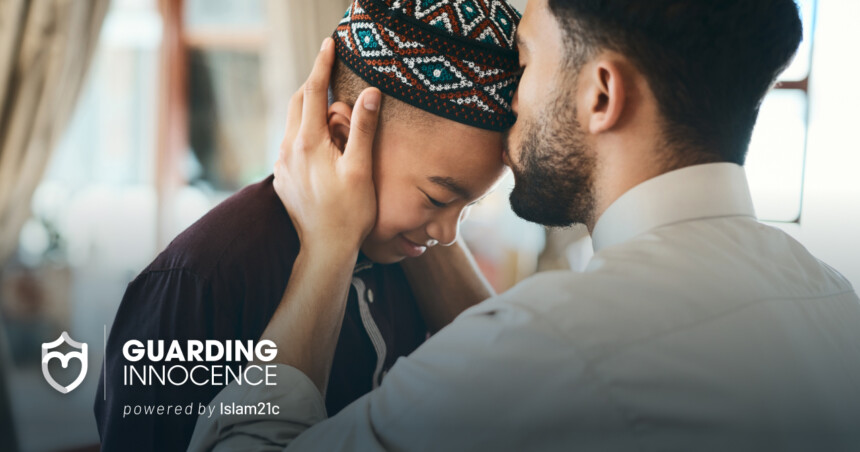In various collections of hadīth, albeit with slight variations, Abu Hurayrah reported that al-Aqra’ bin Habis saw Allah’s Messenger ﷺ kissing Hasan (radiy Allahu ‘anhum), and that al-Aqra’ said,
I have ten children, but I have never kissed any one of them.’
Whereupon, Allah’s Messenger said: ‘He who does not show mercy [towards his children], no mercy would be shown to him.’” [1]
This beautiful narration is frequently referred to, because it so eloquently and simply describes the mercy that Allah has for us, and which He expects us to have for others.
When we read this hadīth, the context preluding the Prophet’s statement (ﷺ) means we usually look at it from the perspective of mercy towards children. There is no doubt that this is one of the greatest lessons we can extrapolate. Upon a closer reading, however, it becomes apparent that there are many more layers of meaning from which we can infer countless pearls of wisdom and Prophetic guidance.
Adults parent how they were parented
The Prophet ﷺ affectionately kisses his grandson, and upon seeing this overt display of affection, al-Aqra’ immediately (and somewhat surprisingly) says,
I have ten children, but I have never kissed any one of them.” [1]
For many of us, the reasoning behind this statement may be beyond our comprehension, but it is important not to leap to any initial conclusions without considering every possible explanation.
For example, have we ever considered that he was perplexed because he himself had not received this level of love and affection as a child? There is every chance he was bemused by the Prophet’s behaviour (ﷺ) because he was unaware that it was a perfectly normal expression of love for the vast majority of people.
Alternatively, it could have been that he felt such public demonstrations of tenderness were not a masculine trait, perhaps his father lacked in showing mercy towards him by way of loving hugs and gentle kisses. It is possible that because he was deprived of parental affection, he internalised this learned behaviour and deprived his children of such compassion — even though it is an essential need at such a delicate stage in life.
Of course, the easiest explanation would probably be that he has not kissed his children due to a lack of compassion and mercy towards them, but there are times when the easiest explanation is chosen for its convenience rather than its accuracy.
A person’s experiences and relationships, particularly those from their childhood, have an immense influence upon their development and transition into adulthood. Even our parental philosophy is a reflection of our past, in one way or another. Whilst al-Aqra’’s statement was his instinctive reaction to what he had seen, it does not mean he was disapproving. Rather, he seemed taken aback because it was something he had not necessarily witnessed or experienced before.
At the end of the day, how are we to give something to another person when it is that which we have never ourselves possessed? Even though he may have felt love and affection for his children, it could have been that al-Aqra’ simply never learned how to express such love and affection in his childhood.
Unconditional love builds self-esteem
Over the years, countless psychological studies have demonstrated that a child who receives unconditional love from their parents will be less inclined to show symptoms of anxiety and demonstrate higher levels of emotional intelligence and strength. [2]
Expressing love and affection to a child comprises the basis of their emotional and psychological development. When a child is emotionally secure and stable, they can then learn how to reciprocate these emotions and use their own experiences to build healthy and constructive attachments with their children.
Indeed, when a child knows they are appreciated and valued, they are given the confidence and support they need to pursue their dreams and aspirations, realise their potential, and become the best possible version of themselves.
A beautiful quality
Mercy, in each manifestation, is a beautiful quality that should be treasured and implemented at every opportunity.
The only way your child can learn how to be merciful is when you teach them by example. And the beauty of mercy? It’s not about grand gestures or dramatic attestations of virtue. Something as simple as a kind word to compliment your child’s efforts, or gently kissing their forehead constitutes an act of mercy. And it is something that will have a lasting impact upon your child throughout their life.
Abu Hurayrah (radiy Allahu ‘anhu) reported that a man came to the Messenger of Allah (ﷺ) and complained about the hardness of his heart.
The Prophet ﷺ said,
If you want to soften your heart, feed the poor and wipe [your hand] over the head of the orphan.” [3]
Here, the Prophet ﷺ did not place the emphasis on providing financially for the child but showing mercy and affection in the absence of a father figure. This highlights that what the father gives to their child is love and affection and the act of wiping the head of your child is an act of mercy.
When you incorporate mercy into your every action and word as a parent, the effect of these small expressions will accumulate with the passage of time. Your child will learn to associate mercy with unconditional love and compassion. After all, it will have such a positive and uplifting influence on their confidence and self-esteem, they will want to pass on this wonderful legacy to their children.
It is for this reason that the ripple effect of your parental behaviour should never be underestimated. You are indirectly teaching your children how to interact with your grandchildren, and your grandchildren with their children. This creates a beautiful intergenerational legacy that will only become stronger as it is transmitted through subsequent generations.
If you do not teach your children mercy, how will they ever know how to be merciful to others, as we can see with al-Aqra’?
A parent is a shepherd, they must be merciful
Abdullah ibn ʿUmar reported that the Messenger of Allah (ﷺ) said,
Every one of you is a shepherd and is responsible for his flock. The leader of people is a guardian and is responsible for his subjects. A man is the guardian of his family and he is responsible for them. A woman is the guardian of her husband’s home and his children, and she is responsible for them. The servant of a man is a guardian of the property of his master and he is responsible for it. No doubt, every one of you is a shepherd and is responsible for his flock.” [4a] [4b]
From this hadīth, we learn about the link between parenting and leadership. And linked to the topic of leadership, a similar incident to that of al-Aqra’ occurred during the caliphate of ʿUmar ibn al-Khattāb (radiy Allahu ‘anhu), when one of his governors came to see him.
He saw ʿUmar kiss one of his children who was sitting on his lap, and responded by saying,
O Commander of the Believers, do you kiss your child, while you are the Commander of the Believers?!”
The parallels between the reactions of the governor and al-Aqra’ are startling.
ʿUmar ibn al-Khattāb’s governor believed that such a public display of affection was not befitting for someone in a position of leadership. Fatherly love is such a natural and instinctual behaviour for the overwhelming majority of people, yet the governor found it strange enough to ask whether someone of such authority should even be kissing their child in the first place.
In response, ʿUmar ibn al-Khattāb said,
What can I do if Allah has deprived you of mercy?”
Consequently, he removed the governor from his position by saying,
If you cannot have mercy on your own children, how will you have mercy upon those who you are responsible for [as a governor]?”
From ʿUmar ibn al-Khattāb’s statement, we can infer another important observation. It is expected that someone should be merciful to their children, above all else. If this mercy is absent, it is inevitable that doubts will emerge regarding that person’s capacity to be merciful in any other context and towards anyone else they may interact with.
We also see another clear link between parenting and leadership: both require mercy as a key trait.
Mercy begets mercy
At the conclusion of the hadīth, the Prophet ﷺ conveys a serious warning with the words,
He who does not show mercy [towards his children], no mercy would be shown to him.”
The Prophet ﷺ taught us that, as imperfect people, we will always be inclined to shortcomings and mistakes, and it is for this reason that we will only enter Paradise by way of Allah’s Mercy.
This means if a person cannot show mercy to others, and especially his children, how can they possibly expect to enter Paradise when it would be impossible without receiving the Mercy of Allah?
As the Prophet ﷺ is reported to have said,
The merciful will be shown mercy by the Most Merciful. Be merciful to those on the Earth and the One in the Heavens will have mercy upon you.” [5]
Allah is the Most Merciful, and because we have been given the capacity for free will, He expects that we should demonstrate such mercy to His creation to honour our obedience and commitment to Him. Considering that the family forms the cornerstone of society, mercy must begin at home for it to be reflected outside of the home.
Love needs to be expressed in different ways
Love is an incredibly meaningful and powerful emotion that has a presence in the heart of every sentient creature. Whether it is the love a believer has for Allah, the love between a husband and wife, the love a child has for their parents, or the love a parent has for their child… it is a feeling with so many layers of meaning and expression that even language is not enough to convey the depth of what love is.
Love is the emotional string that ties our families and societies together — and love is something that needs to be expressed physically, verbally, and emotionally. Through daily affirmations and attestations of love, including kissing and hugging our children whenever we have the opportunity, we are creating an emotional bond that will always anchor them to what is pure, wholesome, and good.
May Allah make us of those who possess a merciful heart and demonstrate that in our words and actions.
Source: Islam21c
Notes
[1] Sahīh Muslim, 2,318a; https://sunnah.com/muslim:2318a
[2] Rivero, E. (2013), Lack of parental warmth, abuse in childhood linked to multiple health risks in adulthood, UCLA
[3] Musnad Ahmad, 7,576
[4a] Sahīh al-Bukhārī 7,138; https://sunnah.com/bukhari:7138
[4b] Sahīh Muslim, 1,829a; https://sunnah.com/muslim:1829a
[5] Tirmidhi, 1,924; https://sunnah.com/tirmidhi:1924







